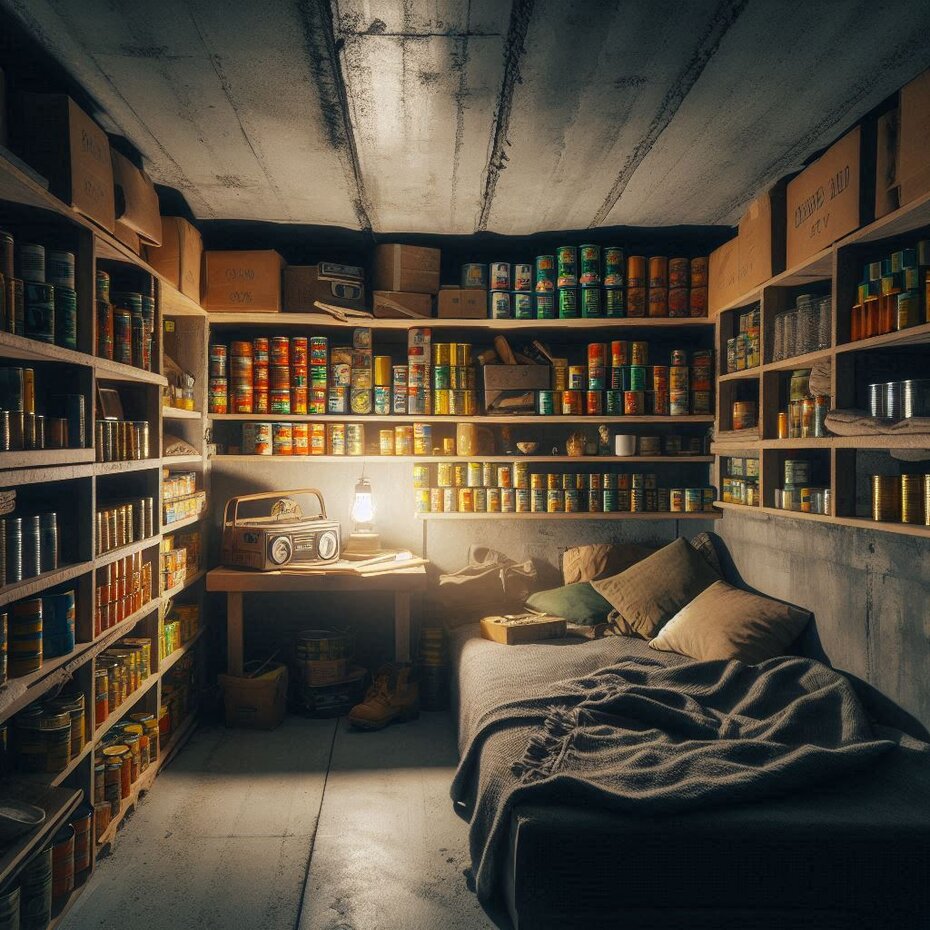Are you one of the preppers?
I've just read that in Switzerland the population has been obliged by law since 1963 to build bunkers in the basement of their homes that are capable of withstanding a nuclear attack. Obviously, this bunker isn't just an extra room. It has thick concrete walls and reinforced doors, an air filter for chemical particles and toxic gases, a stockpile of water, food and medicine. Can you imagine the cost of building, equipping and maintaining all this?

First and foremost, keeping such a stockpile in good condition requires method and determination. I usually keep a small pantry at home, but my lack of organization leads to losses and extra expenses. It's amazing how much food is discarded because of maggots, torn packaging or a shelf life shorter than that promised on the packaging. Medicines not consumed within their expiration date should also be discarded. What about water storage? How many liters of water would a person need to store in the event of a tragedy?
Most Gauchos (people from the southernmost state of Rio Grande do Sul) were faced with these problems last May, when the rivers and Lake Guaíba flooded the streets of the capital and the countryside. Without electricity to power the pumps in the public network and buildings, we had to stock up on water for bathing, flushing toilets, cooking, cleaning and drinking. Do you have any idea how much water each of us uses every day? It's a lot of water. Even with rationing, the main question of water storage remains: where to store it?
Another question I hadn't come across until today is how to cook when there is no electricity and the gas supply is running out. This was the case during the last flood and I must confess that I bitterly regretted having walled up the barbecue grill in the living room of my apartment when I moved to the South. Yes, you read that right, there was a barbecue grill in my living room... a gaucho thing.
In the USA, a significant portion of the population obsessively deals with all the issues surrounding disaster preparedness. They are nicknamed preppers. Their main concern is a possible atomic explosion. However, every year their emergency kits are tested during the hurricane season, which particularly affects the states of Florida, Louisiana and Texas, and lasts from the 1st of June to the 30th of November.
In the United States, the American Red Cross recommends that everyone has an emergency kit at home that is easy to carry in the event of an emergency or disaster. Overkill? The people from Rio Grande do Sul who had to run out of their homes and leave with only their clothes on during the last flood in May certainly don't think so.
Undoubtedly, being caught by surprise in an emergency is the worst-case scenario. That's why people who live in high-risk areas should make a habit of finding out about the risks and how alarm systems work. In Rio de Janeiro, the favelas that suffered in the recent past from the damage caused by the March rains received alarm sirens and a warning center for immediate evacuation. From time to time, the community watches the tests to check that the sirens are working, so that people can flee in time in the event of further landslides. In the South, many people have developed the habit of following river level changes through the recently created website nivelguaiba.com.br, which provides updated information every 5 minutes. In Switzerland, where there are five nuclear power plants, there is a National Alarm Center that measures the level of radioactivity at 76 sites every 10 minutes, and the population is occasionally given a new kit of iodine tablets to take in the event of a radioactive leak.
Yes, there is a lot to think about in order to be prepared in the event of an emergency, and most of us prefer not to think about it. I, for one, have always thought of preppers as “a bunch of crazy people”. But who knows, maybe they'll laugh at people like me one day?
Translated with DeepL.com (free version)
Voltar
